Eventbrite is an all-in-one event management and ticketing solution. It handles everything from new event creation to the marketing, registration, ticket sales and attendee check-in for the event. You can even create post-event surveys and more for better attendee engagement.
Below, we’ll go in-depth into Eventbrite’s pricing, features, use cases, and what we think is good and bad about this platform.
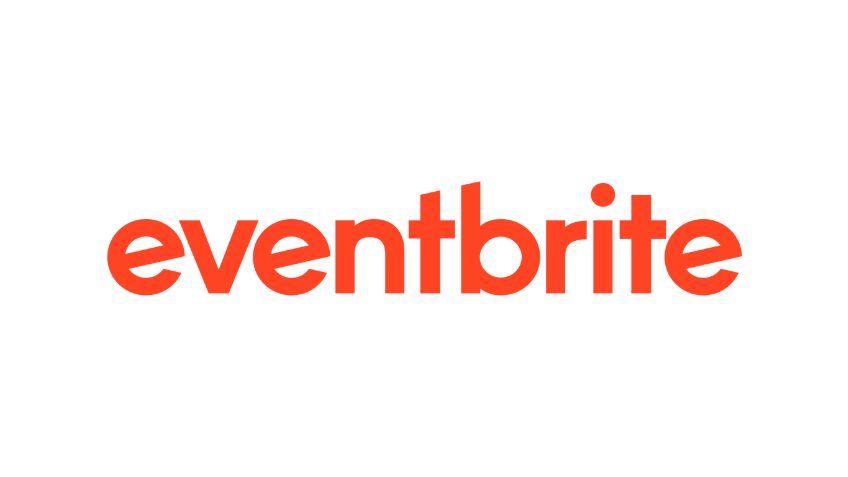
Who Eventbrite Is For
Eventbrite is a great solution for any individual or organization looking to promote events and sell tickets. Whether it be a small occasion, a large annual event, or a corporate meet up, Eventbrite is versatile enough to accommodate any function where tickets are sold and people attend (physically or virtually).
It’s most commonly used for concerts, fairs, festivals, workshops, classes, and conferences. From event promoters and musicians to chambers of commerce and corporate event planners, Eventbrite is an end-to-end solution for a wide array of potential users.
You don’t have to organize a massive entertainment or business event to take advantage of Eventbrite. A local fitness instructor can promote free yoga sessions on the beach or an artist can host a wine and paint night at their studio—the use cases are virtually limitless. We’ve seen retailers use Eventbrite to promote a pop-up shop, nonprofits use it to host fundraisers, and almost everything in between.
Eventbrite Pricing
Eventbrite’s pricing is largely based on event size and frequency. There are two different subscription options for event organizers to choose from: Flex and Pro.
The Flex plan is designed for one-off events, and it’s a pay-as-you-go service billed per event. Plans break down as follows for each event you host and promote on Eventbrite Flex:
- Up to 25 tickets: Free
- Up to 100 tickets: $9.99 per event
- Up to 250 tickets: $24.99 per event
- Unlimited tickets: $49.99 per event
Conversely, the Pro plan is designed for people who are frequently organizing and hosting events. Rather than paying per event, you’ll pay a monthly subscription fee based on how many tickets you’re selling for an unlimited number of events:
- Up to 100 tickets: $29 per month
- Up to 250 tickets: $79 per month
- Unlimited tickets: $159 per month
If you’re selling tickets, there’s also a 3.7% + $1.79 service fee per paid ticket and a 2.9% processing fee on each paid order. These fees are paid by the ticket buyer, but organizers have the option to absorb the costs instead to make tickets more affordable for potential attendees.
The pricing structure is fairly straightforward, and overall it’s a good value for any event size. Most notably, event frequency is the most important factor to consider when deciding between plans.
Let’s say you’re hosting an annual event and expect 5,000 attendees. If you go with the Flex plan, you’re paying just $49.99 to host it, which is fine for a one-off event.
If you’re hosting a monthly event and promoting it year-round, however, you may want to consider a Pro subscription. That’s because the Flex plan limits you to just 250 marketing emails per day, whereas the Pro plan is capped at 10,000 daily emails.
While the $49.99 plan is obviously cheaper, the $159 per month top-end Pro plan would likely be worth it for the added marketing perks.
All plans come with ticketing solutions, marketing tools, data insights, event management software, and a secure payments platform.
Eventbrite Boost is a separate, paid add-on that ranges from $15 to $100, not including associated ad spend. This feature unlocks premium marketing and advertising tools, and you can save 20% on the rate by opting for annual billing.
While Eventbrite Flex and Pro are self-service forms of this platform, Eventbrite Premium delivers a more managed option for large or complex events. Organizer fees are waived, and you’ll have access to custom ticketing fees, a customized payout structure, and unlimited types of tickets, plus personal assistance from the team at Eventbrite. You’ll have to contact Eventbrite sales for more information about the Premium plan.
Otherwise, you can sign-up for a 14-day free trial of Eventbrite to test out the Pro subscription. The Eventbrite Flex plan for up to 25 tickets is always free.
Pros and Cons of Eventbrite
There’s a lot to love about Eventbrite. From its user-friendliness to its built-in tools for promotion, organization, and attendee engagement, it’s a solution favored by event organizers and attendees alike. But the platform isn’t perfect, and there are a few shortcomings that you should be aware of.
The pros and cons below are based on a combination of real user reviews and our own research.
Eventbrite Pros
- End-to-end event management: Eventbrite has everything organizers need to create and run successful events, from initial event creation to ticket sales, marketing, and day-of management. It’s truly an all-in-one, 360-degree event management platform.
- Embedded checkout: Rather than having to redirect site visitors to Eventbrite for purchase, you can set up an integrated Eventbrite checkout directly on your own website.
- Transparent fees: While its service fees might be on the higher side, Eventbrite is transparent about the fees charged to organizers and ticket buyers. You’ll always have clarity about what (and why) you and your audience are being charged.
- Built-in marketing: When you create an event with Eventbrite, you gain access to a complete suite of marketing tools that can help with smart audience targeting, emails, and social sharing. You don’t have to rely on third-party marketing platforms to promote your event.
- Simple on-site check-in: On the day of an event, it’s easy to verify tickets and registrations through quick QR code scanning. This helps reduce wait times and makes it easy for organizers to verify that only paid ticket holders are entering.
- Native advertising: Eventbrite has its own advertising platform, in addition to its marketing tools. Generate ticket sales quickly by starting a new campaign within Eventbrite to target potential attendees, say, within 50 miles of your event.
- Brand recognition: Eventbrite has become a name that the average consumer knows, recognizes, and trusts. With more than 90 million active ticket buyers, many people go directly to Eventbrite to browse for new and fun events in their area.
- Proven track record: Last year alone, the platform was used to organize over 5 million events across 180 countries by nearly 800,000 creators who cumulatively sold 284 million tickets.
Eventbrite Cons
- High service fees: Eventbrite service and processing fees are paid by the ticket buyer by default, although organizers have the option to absorb these costs. Either way, with service fees starting at 3.7% + $1.79 per ticket and a 2.9% processing fee per order, an order of two $50 tickets would be charged roughly $13 in extra fees, which is quite high.
- Higher fees in other countries: If your event is located in a country outside of the United States, you can expect even higher rates than the ones mentioned above. For example, there’s a 9% + €0.19 per ticket fee in Spain and a 9.99% service fee for tickets in Brazil.
- Limited ticket types: If you’re on a Flex or Pro subscription, you’ll only be able to create standard admission tickets in Eventbrite. You’ll need to join an Eventbrite Premium plan to unlock multiple ticket options, such as VIP areas, reserved seating, weekend passes, and early bird discounts.
- Upsells for marketing tools: Eventbrite has plenty of built-in marketing features that you can use with your event organizer subscription. But, to get the most out of these features, you’ll likely want to sign up for Eventbrite Boost, which has a separate subscription model and associated charges.
- Limited merchant processing options: You’re forced to use either Eventbrite’s payment processing or PayPal for ticket sales. This means you can’t integrate your own merchant services platform—which is a pain if you’re getting lower processing rates from them.
- Limited ad reach: Eventbrite ads are only available for select major cities, including Atlanta, Boston, Dallas, Chicago, Las Vegas, San Diego, Sydney, London, and Toronto. If you’re hosting an event outside of the roughly 25 supported cities, you’ll need to run ad campaigns on your own via a different channel.
Eventbrite Review: The Details
Eventbrite has tons of different event management tools within its platform. Below, we’ll take a closer look at the major features, highlighting how they work and what we think about them.
Event Ticketing
Eventbrite has a built-in ticketing solution that organizers can use to sell tickets online, and it can even be used to simply register attendees for free events.
Getting started is as simple as creating a new event, choosing between digital or printed tickets, and setting the price. From there, attendees can buy tickets directly through Eventbrite or through an embedded checkout on your website.
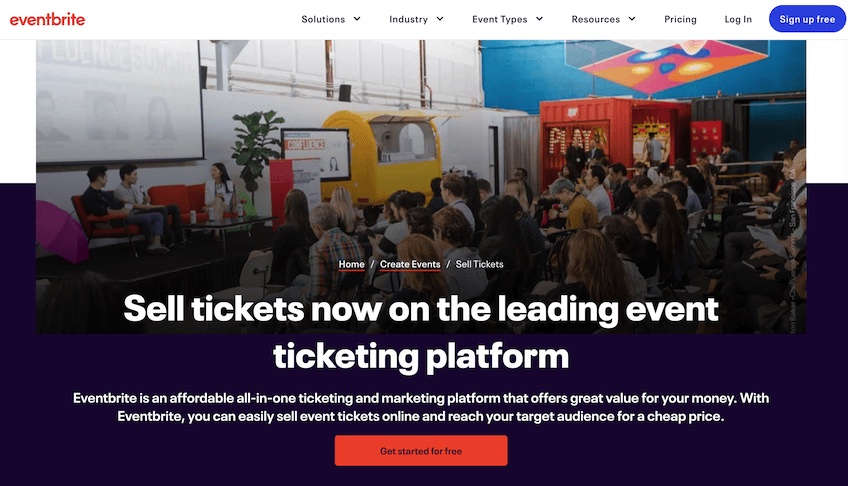
Noteworthy benefits and features of the ticketing platform include:
- Digital and printed ticket options
- Ticket transfers
- Promo codes
- Charge attendees ticket fees or absorb them
- Waitlists
- Reserved seating for weddings, concerts, and other special events
- Custom order forms
- Custom URLs
One cool part about Eventbrite is its ability to accommodate both small and large-scale events. Whether you’re trying to distribute 20 free tickets to a local event or you’re selling admission for a concert that could pack 10,000 people into the venue, the ticketing platform can handle your needs.
It’s worth noting that some of the ticketing features aren’t available with every plan. For example, you’ll need to be on an Eventbrite Premium subscription for ticket transfers, reserved seating, and other ticket types like VIP access and multi-day passes.
Eventbrite Boost
Eventbrite organizers have access to a built-in marketing and advertising suite called Eventbrite Boost that is perfect for building awareness and enthusiasm for your event without having to leave the platform.
This comes with everything you need to sell more tickets, promote the event, and manage communication with your audience leading up to and following the event.
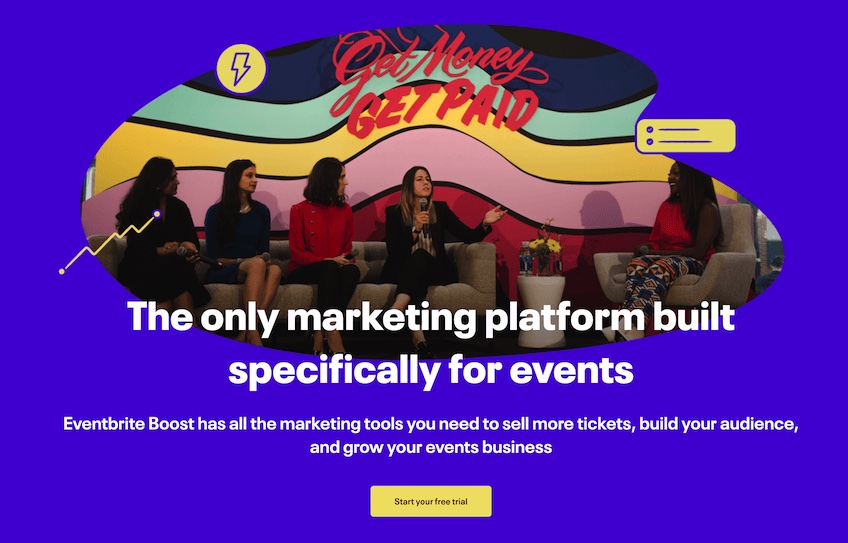
The platform is fully integrated with your event listings and data. Plus, it delivers key benefits like:
- Unlimited contact list size
- Send thousands of daily marketing emails
- Smart targeting recommendations to reach ideal audiences
- Built-in social media advertising
- Marketing insights and reports
- Automated multi-event ad campaigns
Unfortunately, this doesn’t just come with your event organizer subscription. Eventbrite Boost has its own paid plans, starting at $15 per month for up to 2,000 daily emails.
While it would be nice to see these perks included with your regular Eventbrite subscription, we can see why they’re billed separately. This ensures that the base event management software is affordable and that you’re not forced to pay extra for features that you won’t use (especially if you already have a favored marketing and advertising platform).
Eventbrite Organizer App
In addition to the user-friendly, web-based dashboard, event creators also have access to the Eventbrite Organizer app. This is an easy way to manage your event from anywhere via your mobile device, and it’s especially useful during the run-up to an event (and the day of) when you’re constantly on the go.
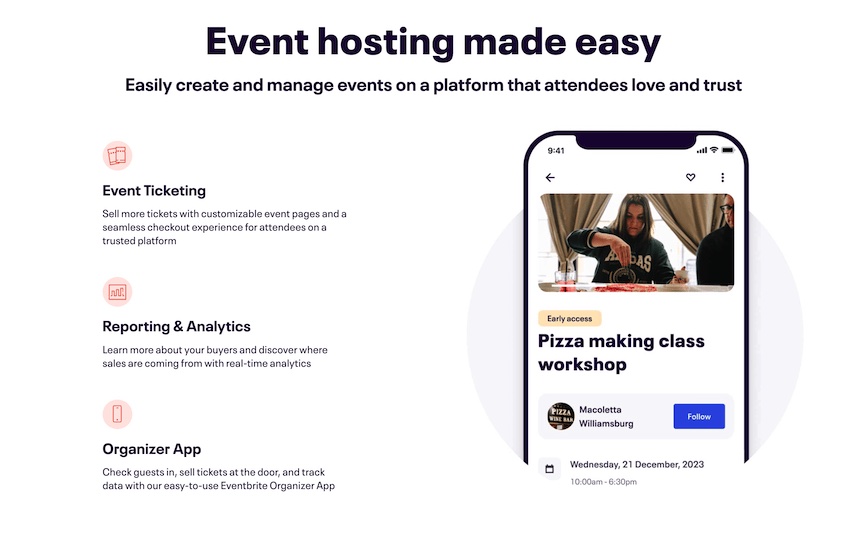
With the Organizer app, you’ll have the ability to:
- Check-in guests with contactless QR codes
- Monitor ticket sales in real time
- Track actual attendance
- Sell walk-up tickets at the door
- Sell merchandise onsite during events
The app is available to anyone hosting an event with Eventbrite at no extra charge. We highly recommend downloading the app and taking advantage of its features. It’s available for both Android and iOS.
Eventbrite Payment Processing
If you’re selling tickets with Eventbrite, you also get access to the platform’s built-in payment system.
One noteworthy benefit of this feature is the ability to get paid for the tickets you’ve sold before your event even takes place. This is really useful if you need help covering the costs of vendors, food, or other inventory that requires a deposit.
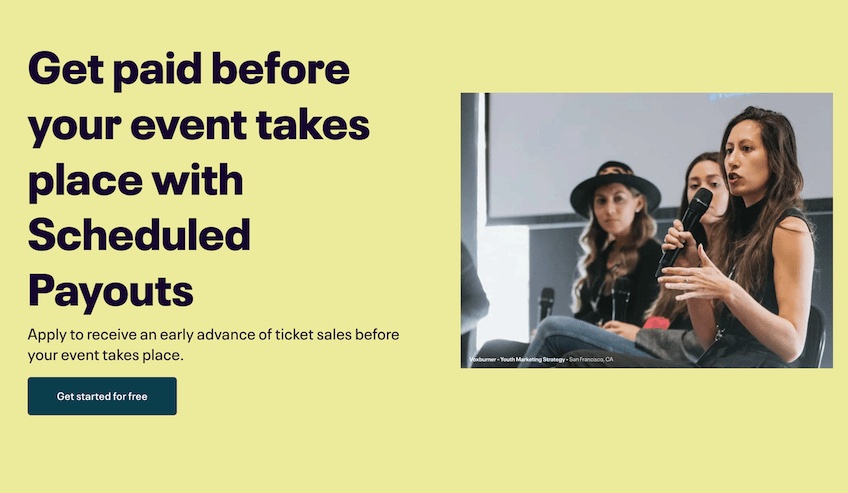
It’s a simple, effective way to get prompt payment for the tickets you sell while also delivering a convenient checkout process for attendees.
The best part about Eventbrite’s payment processing is that everything is handled for you—meaning you don’t have to set up your own payment gateway or processor to sell tickets.
And, you also get the following benefits:
- PCI-compliant transactions
- No hidden fees
- Automated refunds
- Flexible payout schedules
- Accept all major credit cards
- Compatible with Apple Pay and Google Pay
- Payouts via direct deposit or check
- Embedded checkouts on your own website
The downside is that the processing fees aren’t cheap. Unfortunately, too, if you’re a business that currently gets better rates with a third-party processor, you won’t be able to integrate your own merchant services into Eventbrite to get those better rates.
Virtual Events
While Eventbrite is most commonly associated with in-person events like concerts, festivals, and conferences, it can also be used to host, promote, and sell admission to virtual events.
This is a great way for event organizers to expand their reach to a wider audience, as anyone with an internet connection can attend an online event.
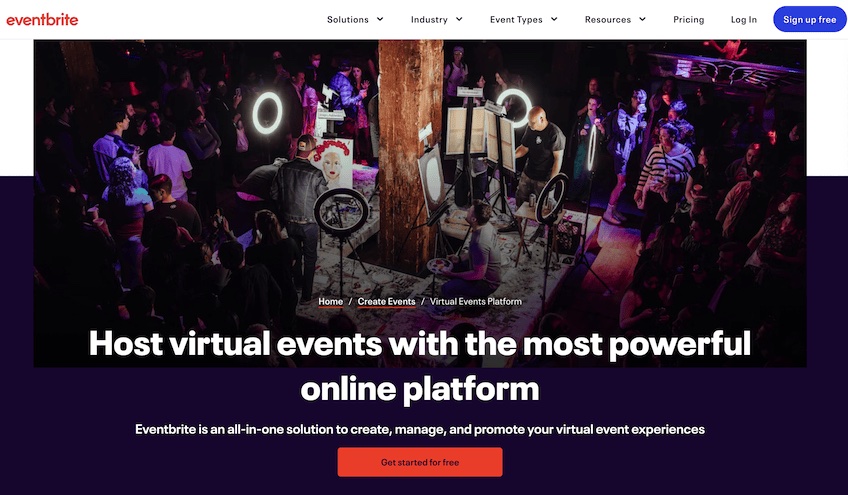
The cool part about this feature is that it can be combined with an in-person event to create a hybrid attendee structure. For example, you can sell tickets to a concert and then also broadcast that performance live to virtual attendees who can’t make it to the venue.
You can integrate your virtual event with a variety of different streaming and video conferencing platforms, including:
- Zoom
- YouTube
- Twitch
- Vimeo
- Facebook Live
The only drawback of hosting virtual events through Eventbrite is that it doesn’t come with a built-in video hosting option. You’ll have to get set up with one of the third-party tools from the list above.
Final Verdict
Eventbrite is a versatile and powerful event management solution. It comes with everything you need to create, manage, promote, and run successful events. You can use it to sell tickets, communicate with your attendees, and even sell merchandise at the event space.
We recommend it to any promoter, event planner, individual, or business looking for a simple and streamlined way to manage events. From custom event pages to integrated payment processing, Eventbrite comes with everything you need to succeed. Start your 14-day free trial today.

